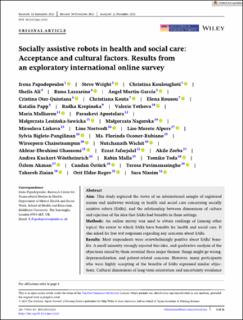Socially assistive robots in health and social care: Acceptance and cultural factors. Results from an exploratory international online survey
Papadopoulos, Irena; Wright, Steve; Koulouglioti, Christina; Ali, Sheila; Lazzarino, Runa; Martín-García, Ángel; Oter-Quintana, Cristina; Kouta, Christiana; Rousou, Elena; Papp, Katalin; Krepinska, Radka; Tothova, Valerie; Malliarou, Maria; Apostolara, Paraskevi; Lesińska-Sawicka, Małgorzata; Nagorska, Małgorzata; Liskova, Miroslava; Nortvedt, Line; Alpers, Lise-Merete; Biglete-Pangilinan, Sylvia; Oconer-Rubiano, Ma. Florinda; Chaisetsampun, Wireeporn; Wichit, Nutchanath; Ghassemi, Akhtar-Ebrahimi; Jafarjalal, Ezzat; Zorba, Akile; Kuckert-Wöstheinrich, Andrea; Malla, Rabin; Toda, Tomiko; Akman, Özlem; Öztürk, Candan; Puvimanasinghe, Teresa; Ziaian, Tahereh; Eldar-Regev, Orit; Nissim, Sara
Peer reviewed, Journal article
Published version

View/
Date
2023Metadata
Show full item recordCollections
Abstract
Aim: This study explored the views of an international sample of registered nurses and midwives working in health and social care concerning socially assistive robots (SARs), and the relationship between dimensions of culture and rejection of the idea that SARs had benefits in these settings.
Methods: An online survey was used to obtain rankings of (among other topics) the extent to which SARs have benefits for health and social care. It also asked for free text responses regarding any concerns about SARs.
Results: Most respondents were overwhelmingly positive about SARs' bene- fits. A small minority strongly rejected this idea, and qualitative analysis of the objections raised by them revealed three major themes: things might go wrong, depersonalization, and patient-related concerns. However, many participants who were highly accepting of the benefits of SARs expressed similar objec- tions. Cultural dimensions of long-term orientation and uncertainty avoidance feature prominently in technology acceptance research. Therefore, the rela- tionship between the proportion of respondents from each country who felt that SARs had no benefits and each country's ratings on long-term orienta- tion and uncertainty avoidance were also examined. A significant positive correlation was found for long-term orientation, but not for uncertainty avoidance.
Conclusion: Most respondents were positive about the benefits of SARs, and similar concerns about their use were expressed both by those who strongly accepted the idea that they had benefits and those who did not. Some evidence was found to suggest that cultural factors were related to rejecting the idea that SARs had benefits.
